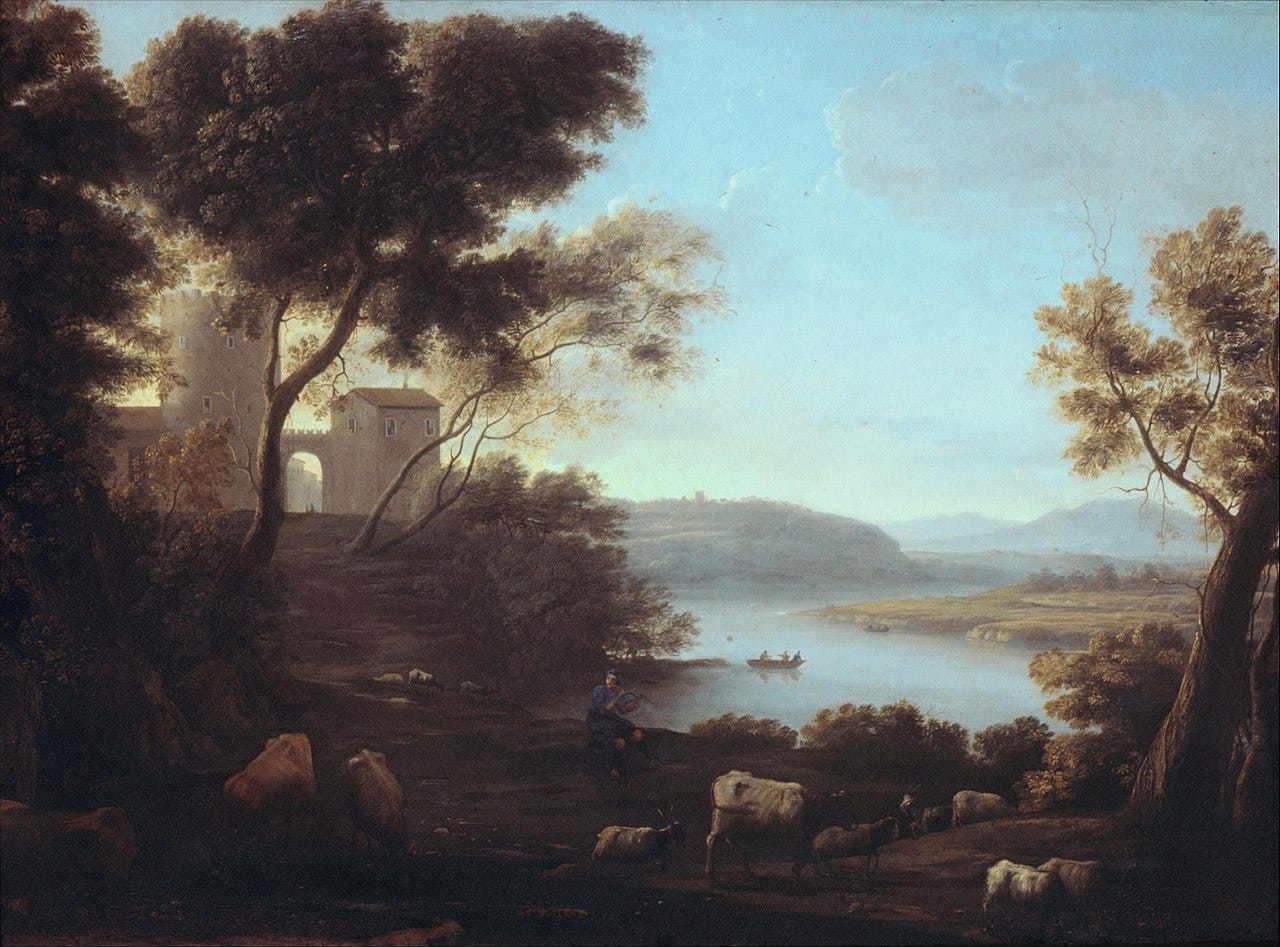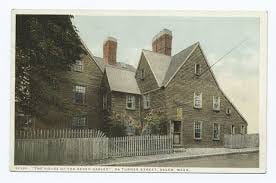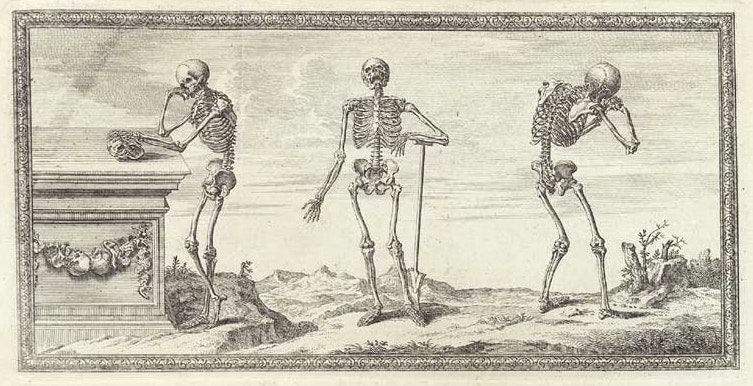Falling under the spell of a supposed evil-doer
This week we bring you something spooky: a haunting excerpt from a novel that deals with superstitions and ghosts in a quaint New England town
The House of the Seven Gables by Nathaniel Hawthorne
The story so far…
The Pyncheon and Maule families have been feuding for generations. In this scene, the carpenter Matthew Maule has been invited to the famed home of Mr Pyncheon, who wishes to know the location of a lost parchment. In exchange for the information, Matthew asks ominously to see Pyncheon’s daughter, Alice…and proceeds to mesmerize her!
Now read on:
Mr. Pyncheon’s long residence abroad, and intercourse with men of wit and fashion,—courtiers, worldlings, and free-thinkers,—had done much towards obliterating the grim Puritan superstitions, which no man of New England birth at that early period could entirely escape. But, on the other hand, had not a whole community believed Maule’s grandfather to be a wizard? Had not the crime been proved? Had not the wizard died for it? Had he not bequeathed a legacy of hatred against the Pyncheons to this only grandson, who, as it appeared, was now about to exercise a subtle influence over the daughter of his enemy’s house? Might not this influence be the same that was called witchcraft?
Turning half around, he caught a glimpse of Maule’s figure in the looking-glass. At some paces from Alice, with his arms uplifted in the air, the carpenter made a gesture as if directing downward a slow, ponderous, and invisible weight upon the maiden.
“Stay, Maule!” exclaimed Mr. Pyncheon, stepping forward. “I forbid your proceeding further!”
“Pray, my dear father, do not interrupt the young man,” said Alice, without changing her position. “His efforts, I assure you, will prove very harmless.”
Again Mr. Pyncheon turned his eyes towards the Claude.

It was then his daughter’s will, in opposition to his own, that the experiment should be fully tried. Henceforth, therefore, he did but consent, not urge it. And was it not for her sake far more than for his own that he desired its success? That lost parchment once restored, the beautiful Alice Pyncheon, with the rich dowry which he could then bestow, might wed an English duke or a German reigning-prince, instead of some New England clergyman or lawyer! At the thought, the ambitious father almost consented, in his heart, that, if the devil’s power were needed to the accomplishment of this great object, Maule might evoke him. Alice’s own purity would be her safeguard.
With his mind full of imaginary magnificence, Mr. Pyncheon heard a half-uttered exclamation from his daughter. It was very faint and low; so indistinct that there seemed but half a will to shape out the words, and too undefined a purport to be intelligible. Yet it was a call for help!—his conscience never doubted it;—and, little more than a whisper to his ear, it was a dismal shriek, and long re-echoed so, in the region round his heart! But this time the father did not turn.
After a further interval, Maule spoke.
“Behold your daughter,” said he.
Mr. Pyncheon came hastily forward. The carpenter was standing erect in front of Alice’s chair, and pointing his finger towards the maiden with an expression of triumphant power, the limits of which could not be defined, as, indeed, its scope stretched vaguely towards the unseen and the infinite. Alice sat in an attitude of profound repose, with the long brown lashes drooping over her eyes.
“There she is!” said the carpenter. “Speak to her!”
“Alice! My daughter!” exclaimed Mr. Pyncheon. “My own Alice!”
She did not stir.
“Louder!” said Maule, smiling.
“Alice! Awake!” cried her father. “It troubles me to see you thus! Awake!”
He spoke loudly, with terror in his voice, and close to that delicate ear which had always been so sensitive to every discord. But the sound evidently reached her not. It is indescribable what a sense of remote, dim, unattainable distance betwixt himself and Alice was impressed on the father by this impossibility of reaching her with his voice.
“Best touch her!” said Matthew Maule “Shake the girl, and roughly, too! My hands are hardened with too much use of axe, saw, and plane,—else I might help you!”
Mr. Pyncheon took her hand, and pressed it with the earnestness of startled emotion. He kissed her, with so great a heart-throb in the kiss, that he thought she must needs feel it. Then, in a gust of anger at her insensibility, he shook her maiden form with a violence which, the next moment, it affrighted him to remember. He withdrew his encircling arms, and Alice—whose figure, though flexible, had been wholly impassive—relapsed into the same attitude as before these attempts to arouse her. Maule having shifted his position, her face was turned towards him slightly, but with what seemed to be a reference of her very slumber to his guidance.
Then it was a strange sight to behold how the man of conventionalities shook the powder out of his periwig; how the reserved and stately gentleman forgot his dignity; how the gold-embroidered waistcoat flickered and glistened in the firelight with the convulsion of rage, terror, and sorrow in the human heart that was beating under it.
“Villain!” cried Mr. Pyncheon, shaking his clenched fist at Maule. “You and the fiend together have robbed me of my daughter. Give her back, spawn of the old wizard, or you shall climb Gallows Hill in your grandfather’s footsteps!”
“Softly, Mr. Pyncheon!” said the carpenter with scornful composure. “Softly, an’ it please your worship, else you will spoil those rich lace-ruffles at your wrists! Is it my crime if you have sold your daughter for the mere hope of getting a sheet of yellow parchment into your clutch? There sits Mistress Alice quietly asleep. Now let Matthew Maule try whether she be as proud as the carpenter found her awhile since.”
What we love about this excerpt….
Something that makes the passage so spooky is that it’s told in such a sober, objective way. Hawthorne treads a thin line between telling us what happened and showing us its effects, thereby asking the reader to draw their own conclusions. Although clearly drawing on the fad of ‘mesmerism’, he does not want to attribute Maule’s violence to any wizardry or magic, which would make the account seem mere fancy or whimsy and lessen the story’s impact. Instead, he invests the scene with forensic detail, and with wonderfully ominous touches like Maule standing in front of Alice with his finger pointing to ‘the unseen and the infinite’ and Alice in ‘profound repose, with the long brown lashes drooping over her eyes.’ Is Maule, as his name may suggest, the devil incarnate? Or has Alice merely been mesmerized, a fad of Hawthorne’s times and the subject of many of work of popular fiction and theatre?
Mesmerism was the name given to the practice developed by Franz Anton Mesmer (died 1815), who pioneered an early form of hypnotism. It raises disturbing questions about human agency, the autonomy of the self, and one’s susceptibility to the will of others.
About the author
Nathaniel Hawthorne (1804-64) was one of the pre-eminent American novelists of his era. His dark romances were often set in the colonial America of his ancestors and tested their Puritan ideology. In addition to The House of the Seven Gables, other popular works such as The Scarlet Letter (1850) brought him acclaim. He was active in the period often called the American Renaissance: an epoch before the Civil War, which saw a great outgrowth of literary talent in America and included authors such as Edgar Allan Poe, Herman Melville, Walt Whitman, Henry David Thoreau, Ralph Waldo Emerson, and Emily Dickinson (though she did not publish her poetry in her lifetime).
To read alongside...
You might be interested in a previous newsletter exploring folk culture and superstition in the works of another American writer, Zora Neale Hurston
A chilling, undead tale from African-American folklore
Zora Neale Hurston, “High Walker and Bloody Bones”
Suggest a LitHit!
Tell us your own favourites from literature you've read, and become a Guest Curator. Just email us with the following information:
Your full name (and whether you want to be named or be anonymous in the newsletter—either option is fine!)
The title of the book you're suggesting
The location of the excerpt within the book (e.g., "in the middle of chapter 5"), or the excerpt itself copied into the email or attached to it (in Word)
Why you love it, in just a few sentences
**Please note that we welcome all suggestions but at the moment we can only release excerpts that are out of copyright and in the public domain. This means 75 years or more since the author's death. You can find many such out-of-copyright texts on the internet, for example at Project Gutenberg and Standard Ebooks.
About LitHits
You might also enjoy...
Writers Make Worlds: https://writersmakeworlds.com/
The Ten Minute Book Club: https://www.english.ox.ac.uk/ten-minute-book-club
Project Gutenberg: https://www.gutenberg.org/
Standard Ebooks: https://standardebooks.org/
The Poetry Foundation: https://www.poetryfoundation.org/
“Five Tips to Get Reading Again if You’ve Struggled During the Pandemic,” The Conversation (8 January 2021): https://theconversation.com/five-tips-to-get-reading-again-if-youve-struggled-during-the-pandemic-152904
Feedback
We'd love to hear your thoughts on our newsletter:
kirsten@lit-hits.co.uk
Graphic design by Sara Azmy
All curation content © 2024 LitHits. All rights reserved.





